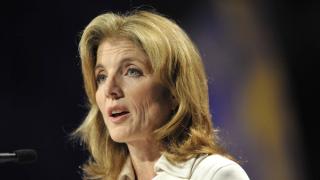In May, rumours of Caroline Kennedy’s appointment as US ambassador to Australia set us on edge with excitement. The prospect of the closest thing to American royalty – a Kennedy with star-quality, and composure – coming to be Biden’s much more glamorous mouthpiece in Australia was almost too tantalising. Were we really to be so lucky?
Now, after months of silence and following a stern plea from Secretary of State Antony Blinken for the Senate to fill the more-than 180 vacant US ambassadorial positions, it finally looks as if Australia might be getting its own piece of Camelot.
But is there more to Kennedy’s appointment than its appeal to our bleeding hearts for a daughter beset by tragedies? In a time of heightened importance for the US-Australian alliance, the answer is thankfully: yes.
They are most strongly connected through Biden’s 36-year Senate service with her uncle and godfather, Senator Ted Kennedy. Indeed, Biden not only credits Senator Kennedy as an important mentor throughout his political career, but as a close friend and confidant.
It is no secret in Washington that Australia is a comfortable and desirable ambassadorial posting for American diplomats, and is a position often afforded to friends and allies of the president.
President George W. Bush appointed his former Yale roommate, Robert McCallum Jr in 2006 and President Barack Obama appointed the man who recruited him as a lawyer 20 years prior, Jeff Bleich.
President Biden and Caroline Kennedy share a strong friendship. They are most strongly connected through Biden’s 36-year Senate service with her uncle and godfather, Senator Ted Kennedy. Indeed, Biden not only credits Senator Kennedy as an important mentor throughout his political career, but as a close friend and confidant.
But the Bidens and Kennedys share more than Democratic values. The families are bonded through tragedy. Following Ted Kennedy’s passing from brain cancer in 2009, Biden delivered a eulogy where he reflected: “At every single important stage of my life, he was there… he was there when I lost my wife and daughter. He was there when I was ill. He was there at every high point and low point of my life. He felt like a big brother. He was always there for me.” President Biden would lose his own son to the same type of brain cancer only six years later.
But, if a brotherly-type connection to her uncle weren’t enough, Kennedy almost certainly sealed the deal with her early endorsement of Biden in the overcrowded 2020 Democratic primaries.
As the daughter, and only surviving child, of the cherished Democratic president John F. Kennedy, Ms Kennedy carries unrivalled clout and her political endorsements matter. We’ve seen this before. In 2008, Kennedy endorsed Obama early in his bid for president, penning her support in a heartfelt New York Times op-ed, ‘A President Like My Father’.
Just weeks before the 2020 South Carolina primary, Caroline Kennedy threw her support behind Biden in an op-ed for The Boston Globe, which gave Biden the highest (and most politically bankable) Democratic honour – a mention of his resemblance to her late father.
Biden came out of South Carolina, set up to become the Democrat’s presumptive presidential candidate, prompting his most significant rival, Bernie Sanders, to call it quits in early April, and leading him to success on his third attempt at the presidency at 77 years old.
Kennedy’s star-quality ensures her the attention of important decision-makers and the media on her own terms. Kennedy’s relationship to Biden means that she has the ear of the most important decision-maker – the US President.
If a helpful endorsement like that won’t get you a nice posting Down Under, what will?
Between 2013 and 2017, Ms Kennedy was appointed US ambassador to Japan and received positive, if not glowing, reviews as a trusted, respected, and well-loved ambassador among Japanese officials and the public.
This style of diplomacy bolstered the ambassador’s powers of persuasion at crucial moments during the Obama administration’s rebalance to Asia.
This year Ambassador Kennedy was awarded the Grand Cordon Rising Sun – the highest honour eligible to foreigners in Japan.
There are two key takeaways for Australia from Kennedy’s appointment.
First, Kennedy’s star-quality ensures her the attention of important decision-makers and the media on her own terms. Kennedy’s relationship to Biden means that she has the ear of the most important decision-maker – the US President. This means Australia’s interests are closer to the President’s attention than we could have hoped.
Second, it irrefutably clarifies that the Biden administration is taking the concerns of its allies and partners in the Indo-Pacific seriously. Australia is an idyllic appointment – we have the nice climate, common values, a shared language – but, beyond these comforts, the appointment is an important one for critical US interests.
The US-Australian alliance is arguably more significant now than it has been since the signing of the ANZUS treaty over 70 years ago. In her official statement today, Kennedy acknowledged this, calling Australia “a country that is vital to our future security and prosperity”.
If there’s something Biden has been made clear in his appointments (however slow) this year, the president nominates people he trusts to positions of great importance.






